Understanding the Key Motivational Factors for Children in School
VerifiedAdded on 2023/04/24
|10
|2619
|216
Essay
AI Summary
This essay delves into the multifaceted factors that contribute to children's motivation to learn in school, emphasizing the crucial roles played by parents, teachers, and the learning environment. It discusses how teachers can serve as role models, understand individual student needs, and set realistic yet challenging goals to foster motivation. Appropriate testing and grading systems are also highlighted as essential components. The essay further examines the significance of parental involvement, including assisting with homework and regularly monitoring academic performance. Drawing upon research, the essay references studies on Jamaican undergraduate students, parental behaviors related to homework motivation, and the impact of teacher-student interpersonal relationships. These studies underscore the importance of cultural sensitivity, socio-emotional support, and positive classroom climates in enhancing student motivation. Ultimately, the essay advocates for a holistic approach that integrates supportive relationships, realistic expectations, and culturally relevant strategies to cultivate a strong drive for learning in children.
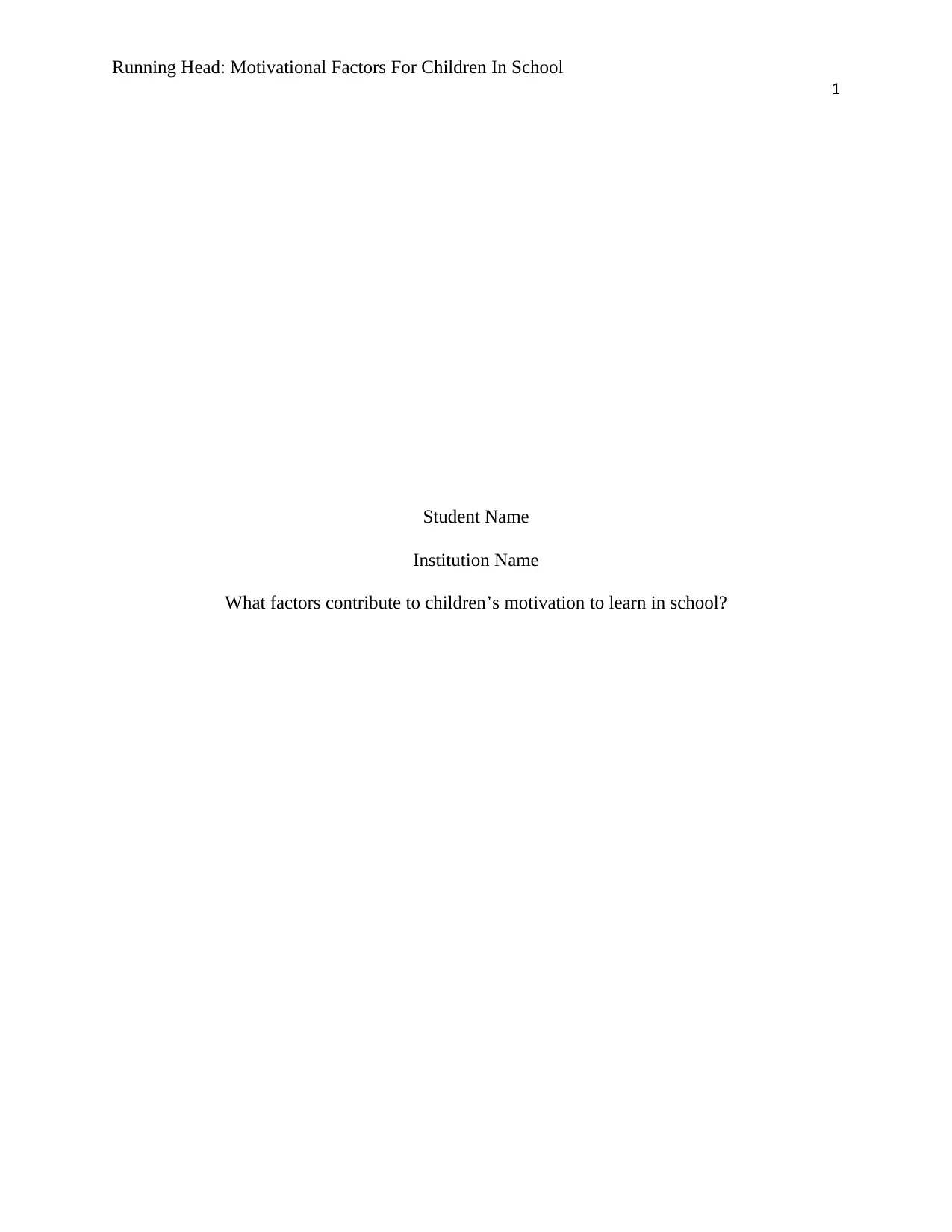
Running Head: Motivational Factors For Children In School
1
Student Name
Institution Name
What factors contribute to children’s motivation to learn in school?
1
Student Name
Institution Name
What factors contribute to children’s motivation to learn in school?
Paraphrase This Document
Need a fresh take? Get an instant paraphrase of this document with our AI Paraphraser
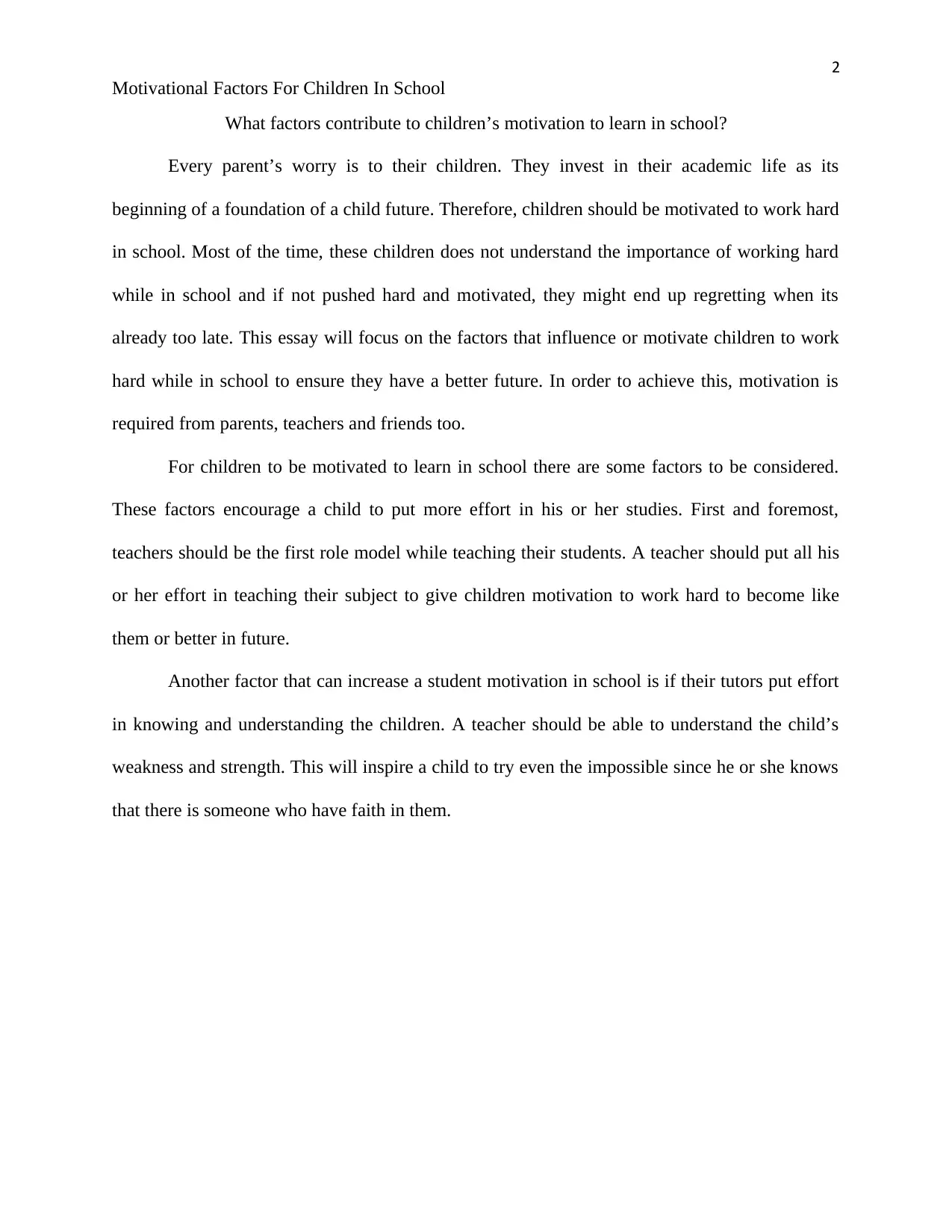
2
Motivational Factors For Children In School
What factors contribute to children’s motivation to learn in school?
Every parent’s worry is to their children. They invest in their academic life as its
beginning of a foundation of a child future. Therefore, children should be motivated to work hard
in school. Most of the time, these children does not understand the importance of working hard
while in school and if not pushed hard and motivated, they might end up regretting when its
already too late. This essay will focus on the factors that influence or motivate children to work
hard while in school to ensure they have a better future. In order to achieve this, motivation is
required from parents, teachers and friends too.
For children to be motivated to learn in school there are some factors to be considered.
These factors encourage a child to put more effort in his or her studies. First and foremost,
teachers should be the first role model while teaching their students. A teacher should put all his
or her effort in teaching their subject to give children motivation to work hard to become like
them or better in future.
Another factor that can increase a student motivation in school is if their tutors put effort
in knowing and understanding the children. A teacher should be able to understand the child’s
weakness and strength. This will inspire a child to try even the impossible since he or she knows
that there is someone who have faith in them.
Motivational Factors For Children In School
What factors contribute to children’s motivation to learn in school?
Every parent’s worry is to their children. They invest in their academic life as its
beginning of a foundation of a child future. Therefore, children should be motivated to work hard
in school. Most of the time, these children does not understand the importance of working hard
while in school and if not pushed hard and motivated, they might end up regretting when its
already too late. This essay will focus on the factors that influence or motivate children to work
hard while in school to ensure they have a better future. In order to achieve this, motivation is
required from parents, teachers and friends too.
For children to be motivated to learn in school there are some factors to be considered.
These factors encourage a child to put more effort in his or her studies. First and foremost,
teachers should be the first role model while teaching their students. A teacher should put all his
or her effort in teaching their subject to give children motivation to work hard to become like
them or better in future.
Another factor that can increase a student motivation in school is if their tutors put effort
in knowing and understanding the children. A teacher should be able to understand the child’s
weakness and strength. This will inspire a child to try even the impossible since he or she knows
that there is someone who have faith in them.
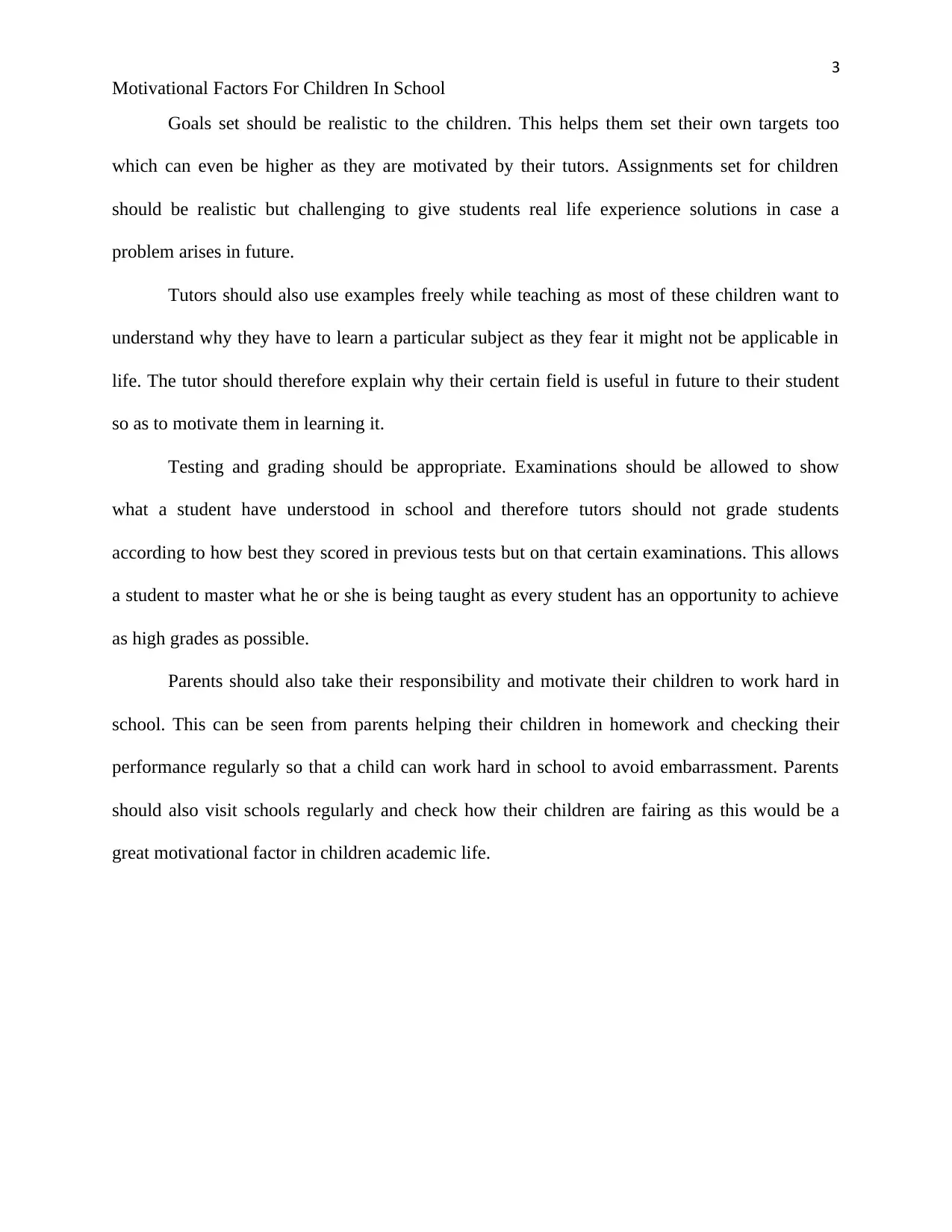
3
Motivational Factors For Children In School
Goals set should be realistic to the children. This helps them set their own targets too
which can even be higher as they are motivated by their tutors. Assignments set for children
should be realistic but challenging to give students real life experience solutions in case a
problem arises in future.
Tutors should also use examples freely while teaching as most of these children want to
understand why they have to learn a particular subject as they fear it might not be applicable in
life. The tutor should therefore explain why their certain field is useful in future to their student
so as to motivate them in learning it.
Testing and grading should be appropriate. Examinations should be allowed to show
what a student have understood in school and therefore tutors should not grade students
according to how best they scored in previous tests but on that certain examinations. This allows
a student to master what he or she is being taught as every student has an opportunity to achieve
as high grades as possible.
Parents should also take their responsibility and motivate their children to work hard in
school. This can be seen from parents helping their children in homework and checking their
performance regularly so that a child can work hard in school to avoid embarrassment. Parents
should also visit schools regularly and check how their children are fairing as this would be a
great motivational factor in children academic life.
Motivational Factors For Children In School
Goals set should be realistic to the children. This helps them set their own targets too
which can even be higher as they are motivated by their tutors. Assignments set for children
should be realistic but challenging to give students real life experience solutions in case a
problem arises in future.
Tutors should also use examples freely while teaching as most of these children want to
understand why they have to learn a particular subject as they fear it might not be applicable in
life. The tutor should therefore explain why their certain field is useful in future to their student
so as to motivate them in learning it.
Testing and grading should be appropriate. Examinations should be allowed to show
what a student have understood in school and therefore tutors should not grade students
according to how best they scored in previous tests but on that certain examinations. This allows
a student to master what he or she is being taught as every student has an opportunity to achieve
as high grades as possible.
Parents should also take their responsibility and motivate their children to work hard in
school. This can be seen from parents helping their children in homework and checking their
performance regularly so that a child can work hard in school to avoid embarrassment. Parents
should also visit schools regularly and check how their children are fairing as this would be a
great motivational factor in children academic life.
⊘ This is a preview!⊘
Do you want full access?
Subscribe today to unlock all pages.

Trusted by 1+ million students worldwide
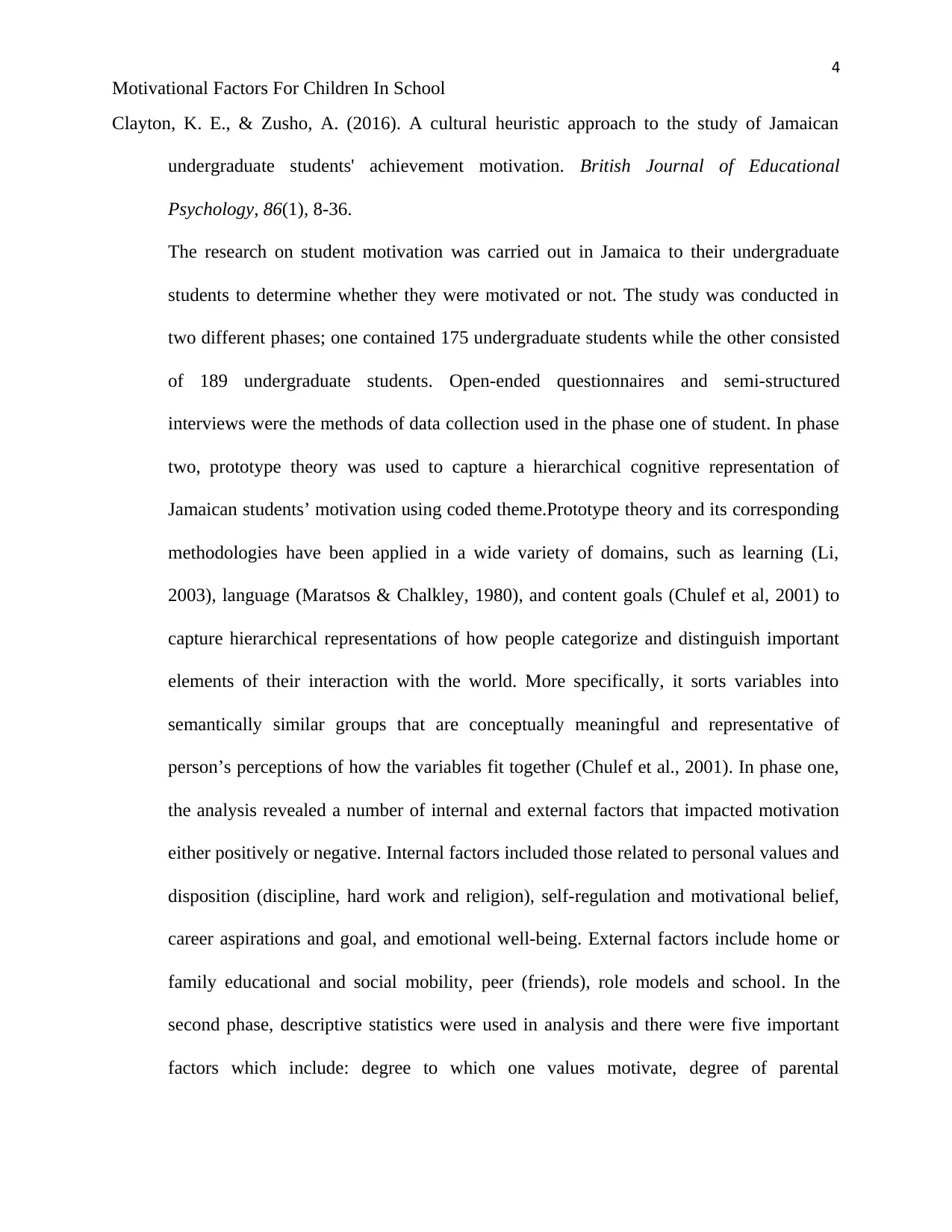
4
Motivational Factors For Children In School
Clayton, K. E., & Zusho, A. (2016). A cultural heuristic approach to the study of Jamaican
undergraduate students' achievement motivation. British Journal of Educational
Psychology, 86(1), 8-36.
The research on student motivation was carried out in Jamaica to their undergraduate
students to determine whether they were motivated or not. The study was conducted in
two different phases; one contained 175 undergraduate students while the other consisted
of 189 undergraduate students. Open-ended questionnaires and semi-structured
interviews were the methods of data collection used in the phase one of student. In phase
two, prototype theory was used to capture a hierarchical cognitive representation of
Jamaican students’ motivation using coded theme.Prototype theory and its corresponding
methodologies have been applied in a wide variety of domains, such as learning (Li,
2003), language (Maratsos & Chalkley, 1980), and content goals (Chulef et al, 2001) to
capture hierarchical representations of how people categorize and distinguish important
elements of their interaction with the world. More specifically, it sorts variables into
semantically similar groups that are conceptually meaningful and representative of
person’s perceptions of how the variables fit together (Chulef et al., 2001). In phase one,
the analysis revealed a number of internal and external factors that impacted motivation
either positively or negative. Internal factors included those related to personal values and
disposition (discipline, hard work and religion), self-regulation and motivational belief,
career aspirations and goal, and emotional well-being. External factors include home or
family educational and social mobility, peer (friends), role models and school. In the
second phase, descriptive statistics were used in analysis and there were five important
factors which include: degree to which one values motivate, degree of parental
Motivational Factors For Children In School
Clayton, K. E., & Zusho, A. (2016). A cultural heuristic approach to the study of Jamaican
undergraduate students' achievement motivation. British Journal of Educational
Psychology, 86(1), 8-36.
The research on student motivation was carried out in Jamaica to their undergraduate
students to determine whether they were motivated or not. The study was conducted in
two different phases; one contained 175 undergraduate students while the other consisted
of 189 undergraduate students. Open-ended questionnaires and semi-structured
interviews were the methods of data collection used in the phase one of student. In phase
two, prototype theory was used to capture a hierarchical cognitive representation of
Jamaican students’ motivation using coded theme.Prototype theory and its corresponding
methodologies have been applied in a wide variety of domains, such as learning (Li,
2003), language (Maratsos & Chalkley, 1980), and content goals (Chulef et al, 2001) to
capture hierarchical representations of how people categorize and distinguish important
elements of their interaction with the world. More specifically, it sorts variables into
semantically similar groups that are conceptually meaningful and representative of
person’s perceptions of how the variables fit together (Chulef et al., 2001). In phase one,
the analysis revealed a number of internal and external factors that impacted motivation
either positively or negative. Internal factors included those related to personal values and
disposition (discipline, hard work and religion), self-regulation and motivational belief,
career aspirations and goal, and emotional well-being. External factors include home or
family educational and social mobility, peer (friends), role models and school. In the
second phase, descriptive statistics were used in analysis and there were five important
factors which include: degree to which one values motivate, degree of parental
Paraphrase This Document
Need a fresh take? Get an instant paraphrase of this document with our AI Paraphraser
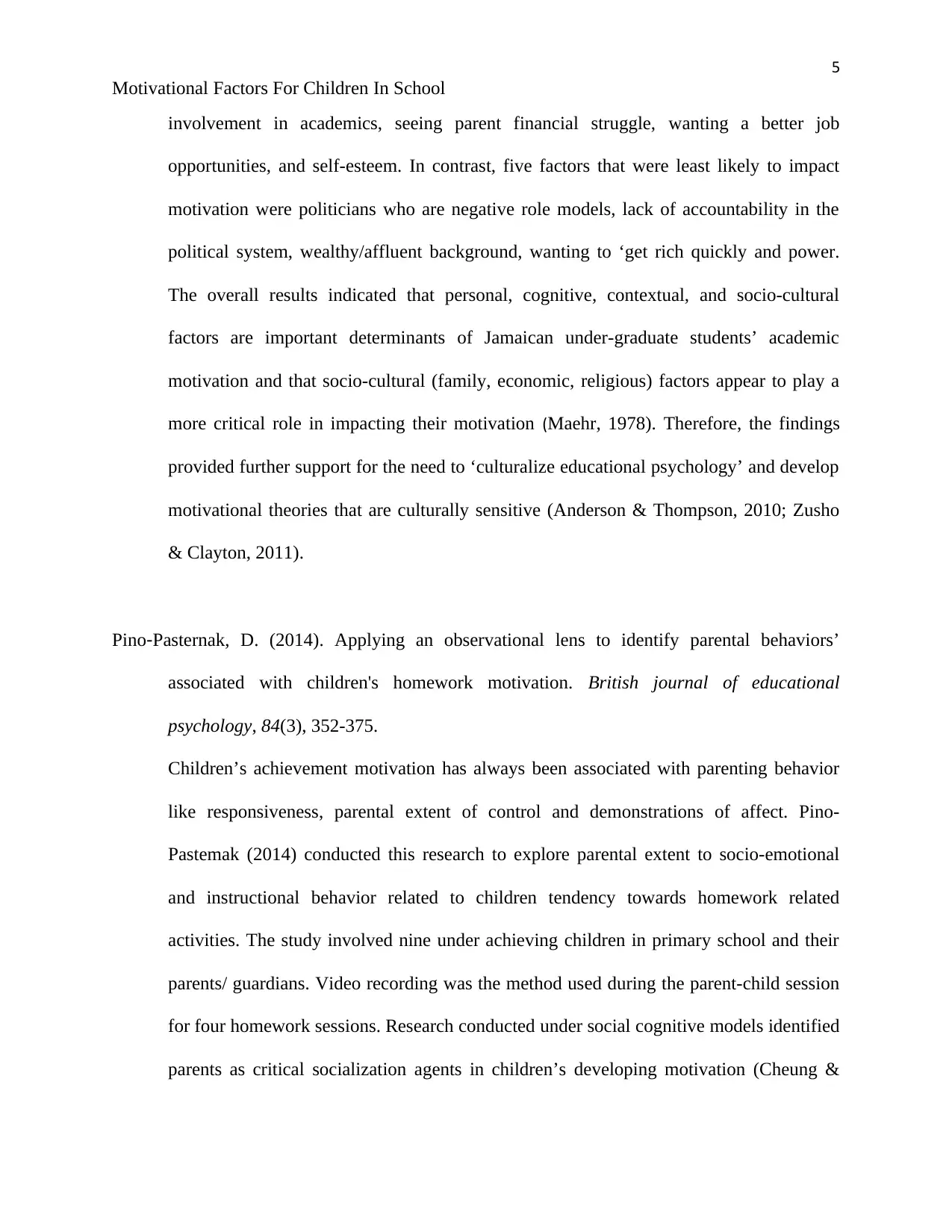
5
Motivational Factors For Children In School
involvement in academics, seeing parent financial struggle, wanting a better job
opportunities, and self-esteem. In contrast, five factors that were least likely to impact
motivation were politicians who are negative role models, lack of accountability in the
political system, wealthy/affluent background, wanting to ‘get rich quickly and power.
The overall results indicated that personal, cognitive, contextual, and socio-cultural
factors are important determinants of Jamaican under-graduate students’ academic
motivation and that socio-cultural (family, economic, religious) factors appear to play a
more critical role in impacting their motivation (Maehr, 1978). Therefore, the findings
provided further support for the need to ‘culturalize educational psychology’ and develop
motivational theories that are culturally sensitive (Anderson & Thompson, 2010; Zusho
& Clayton, 2011).
Pino‐Pasternak, D. (2014). Applying an observational lens to identify parental behaviors’
associated with children's homework motivation. British journal of educational
psychology, 84(3), 352-375.
Children’s achievement motivation has always been associated with parenting behavior
like responsiveness, parental extent of control and demonstrations of affect. Pino-
Pastemak (2014) conducted this research to explore parental extent to socio-emotional
and instructional behavior related to children tendency towards homework related
activities. The study involved nine under achieving children in primary school and their
parents/ guardians. Video recording was the method used during the parent-child session
for four homework sessions. Research conducted under social cognitive models identified
parents as critical socialization agents in children’s developing motivation (Cheung &
Motivational Factors For Children In School
involvement in academics, seeing parent financial struggle, wanting a better job
opportunities, and self-esteem. In contrast, five factors that were least likely to impact
motivation were politicians who are negative role models, lack of accountability in the
political system, wealthy/affluent background, wanting to ‘get rich quickly and power.
The overall results indicated that personal, cognitive, contextual, and socio-cultural
factors are important determinants of Jamaican under-graduate students’ academic
motivation and that socio-cultural (family, economic, religious) factors appear to play a
more critical role in impacting their motivation (Maehr, 1978). Therefore, the findings
provided further support for the need to ‘culturalize educational psychology’ and develop
motivational theories that are culturally sensitive (Anderson & Thompson, 2010; Zusho
& Clayton, 2011).
Pino‐Pasternak, D. (2014). Applying an observational lens to identify parental behaviors’
associated with children's homework motivation. British journal of educational
psychology, 84(3), 352-375.
Children’s achievement motivation has always been associated with parenting behavior
like responsiveness, parental extent of control and demonstrations of affect. Pino-
Pastemak (2014) conducted this research to explore parental extent to socio-emotional
and instructional behavior related to children tendency towards homework related
activities. The study involved nine under achieving children in primary school and their
parents/ guardians. Video recording was the method used during the parent-child session
for four homework sessions. Research conducted under social cognitive models identified
parents as critical socialization agents in children’s developing motivation (Cheung &
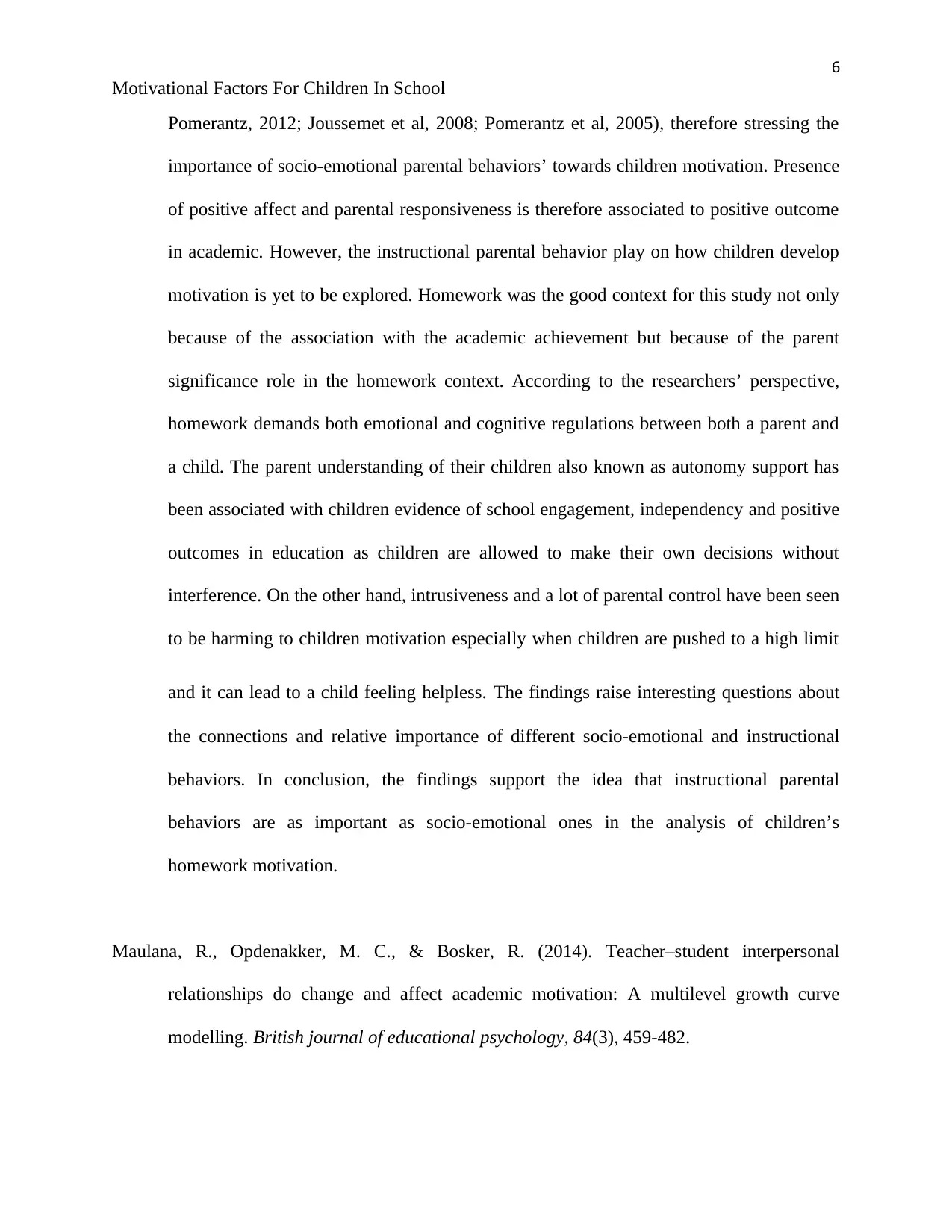
6
Motivational Factors For Children In School
Pomerantz, 2012; Joussemet et al, 2008; Pomerantz et al, 2005), therefore stressing the
importance of socio-emotional parental behaviors’ towards children motivation. Presence
of positive affect and parental responsiveness is therefore associated to positive outcome
in academic. However, the instructional parental behavior play on how children develop
motivation is yet to be explored. Homework was the good context for this study not only
because of the association with the academic achievement but because of the parent
significance role in the homework context. According to the researchers’ perspective,
homework demands both emotional and cognitive regulations between both a parent and
a child. The parent understanding of their children also known as autonomy support has
been associated with children evidence of school engagement, independency and positive
outcomes in education as children are allowed to make their own decisions without
interference. On the other hand, intrusiveness and a lot of parental control have been seen
to be harming to children motivation especially when children are pushed to a high limit
and it can lead to a child feeling helpless. The findings raise interesting questions about
the connections and relative importance of different socio-emotional and instructional
behaviors. In conclusion, the findings support the idea that instructional parental
behaviors are as important as socio-emotional ones in the analysis of children’s
homework motivation.
Maulana, R., Opdenakker, M. C., & Bosker, R. (2014). Teacher–student interpersonal
relationships do change and affect academic motivation: A multilevel growth curve
modelling. British journal of educational psychology, 84(3), 459-482.
Motivational Factors For Children In School
Pomerantz, 2012; Joussemet et al, 2008; Pomerantz et al, 2005), therefore stressing the
importance of socio-emotional parental behaviors’ towards children motivation. Presence
of positive affect and parental responsiveness is therefore associated to positive outcome
in academic. However, the instructional parental behavior play on how children develop
motivation is yet to be explored. Homework was the good context for this study not only
because of the association with the academic achievement but because of the parent
significance role in the homework context. According to the researchers’ perspective,
homework demands both emotional and cognitive regulations between both a parent and
a child. The parent understanding of their children also known as autonomy support has
been associated with children evidence of school engagement, independency and positive
outcomes in education as children are allowed to make their own decisions without
interference. On the other hand, intrusiveness and a lot of parental control have been seen
to be harming to children motivation especially when children are pushed to a high limit
and it can lead to a child feeling helpless. The findings raise interesting questions about
the connections and relative importance of different socio-emotional and instructional
behaviors. In conclusion, the findings support the idea that instructional parental
behaviors are as important as socio-emotional ones in the analysis of children’s
homework motivation.
Maulana, R., Opdenakker, M. C., & Bosker, R. (2014). Teacher–student interpersonal
relationships do change and affect academic motivation: A multilevel growth curve
modelling. British journal of educational psychology, 84(3), 459-482.
⊘ This is a preview!⊘
Do you want full access?
Subscribe today to unlock all pages.

Trusted by 1+ million students worldwide
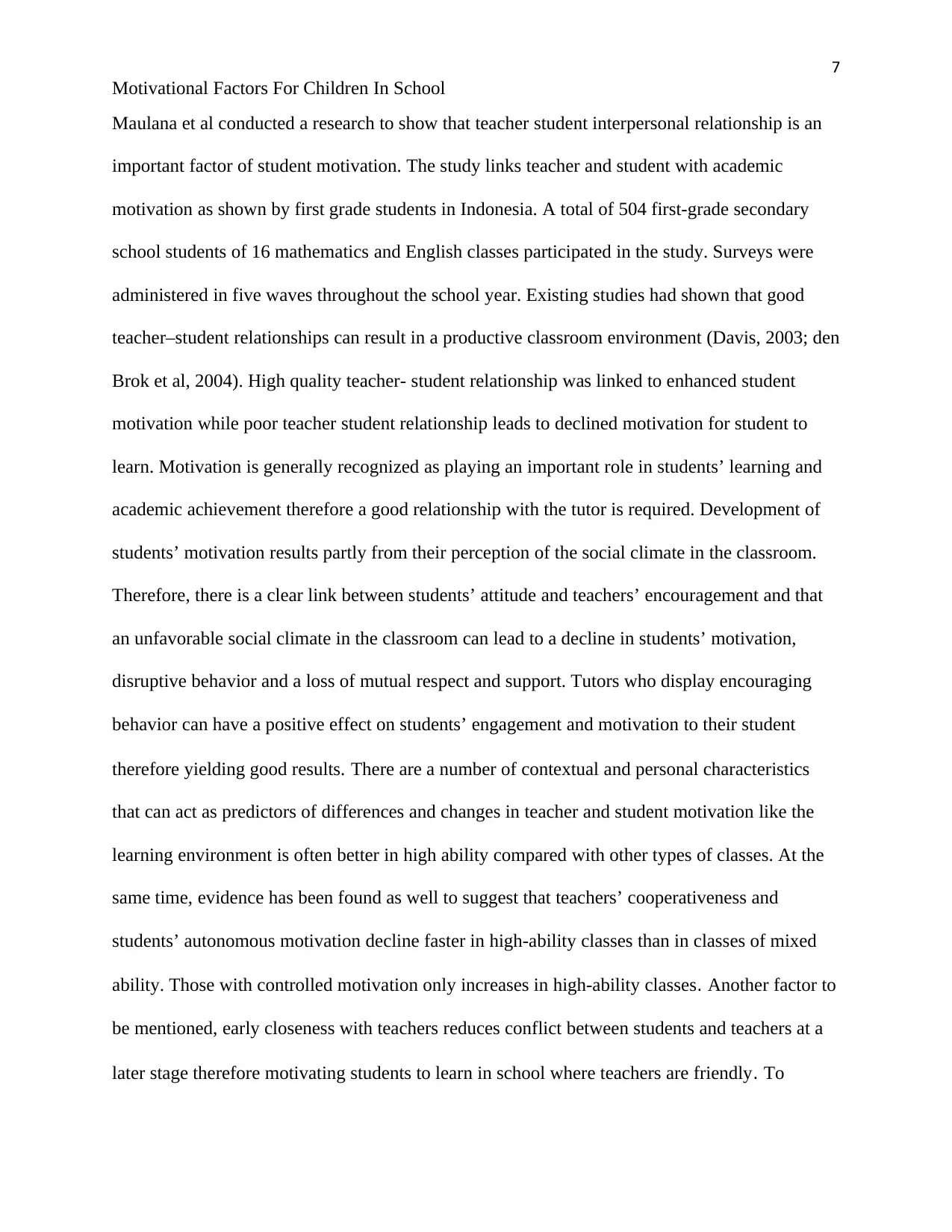
7
Motivational Factors For Children In School
Maulana et al conducted a research to show that teacher student interpersonal relationship is an
important factor of student motivation. The study links teacher and student with academic
motivation as shown by first grade students in Indonesia. A total of 504 first-grade secondary
school students of 16 mathematics and English classes participated in the study. Surveys were
administered in five waves throughout the school year. Existing studies had shown that good
teacher–student relationships can result in a productive classroom environment (Davis, 2003; den
Brok et al, 2004). High quality teacher- student relationship was linked to enhanced student
motivation while poor teacher student relationship leads to declined motivation for student to
learn. Motivation is generally recognized as playing an important role in students’ learning and
academic achievement therefore a good relationship with the tutor is required. Development of
students’ motivation results partly from their perception of the social climate in the classroom.
Therefore, there is a clear link between students’ attitude and teachers’ encouragement and that
an unfavorable social climate in the classroom can lead to a decline in students’ motivation,
disruptive behavior and a loss of mutual respect and support. Tutors who display encouraging
behavior can have a positive effect on students’ engagement and motivation to their student
therefore yielding good results. There are a number of contextual and personal characteristics
that can act as predictors of differences and changes in teacher and student motivation like the
learning environment is often better in high ability compared with other types of classes. At the
same time, evidence has been found as well to suggest that teachers’ cooperativeness and
students’ autonomous motivation decline faster in high-ability classes than in classes of mixed
ability. Those with controlled motivation only increases in high-ability classes. Another factor to
be mentioned, early closeness with teachers reduces conflict between students and teachers at a
later stage therefore motivating students to learn in school where teachers are friendly. To
Motivational Factors For Children In School
Maulana et al conducted a research to show that teacher student interpersonal relationship is an
important factor of student motivation. The study links teacher and student with academic
motivation as shown by first grade students in Indonesia. A total of 504 first-grade secondary
school students of 16 mathematics and English classes participated in the study. Surveys were
administered in five waves throughout the school year. Existing studies had shown that good
teacher–student relationships can result in a productive classroom environment (Davis, 2003; den
Brok et al, 2004). High quality teacher- student relationship was linked to enhanced student
motivation while poor teacher student relationship leads to declined motivation for student to
learn. Motivation is generally recognized as playing an important role in students’ learning and
academic achievement therefore a good relationship with the tutor is required. Development of
students’ motivation results partly from their perception of the social climate in the classroom.
Therefore, there is a clear link between students’ attitude and teachers’ encouragement and that
an unfavorable social climate in the classroom can lead to a decline in students’ motivation,
disruptive behavior and a loss of mutual respect and support. Tutors who display encouraging
behavior can have a positive effect on students’ engagement and motivation to their student
therefore yielding good results. There are a number of contextual and personal characteristics
that can act as predictors of differences and changes in teacher and student motivation like the
learning environment is often better in high ability compared with other types of classes. At the
same time, evidence has been found as well to suggest that teachers’ cooperativeness and
students’ autonomous motivation decline faster in high-ability classes than in classes of mixed
ability. Those with controlled motivation only increases in high-ability classes. Another factor to
be mentioned, early closeness with teachers reduces conflict between students and teachers at a
later stage therefore motivating students to learn in school where teachers are friendly. To
Paraphrase This Document
Need a fresh take? Get an instant paraphrase of this document with our AI Paraphraser
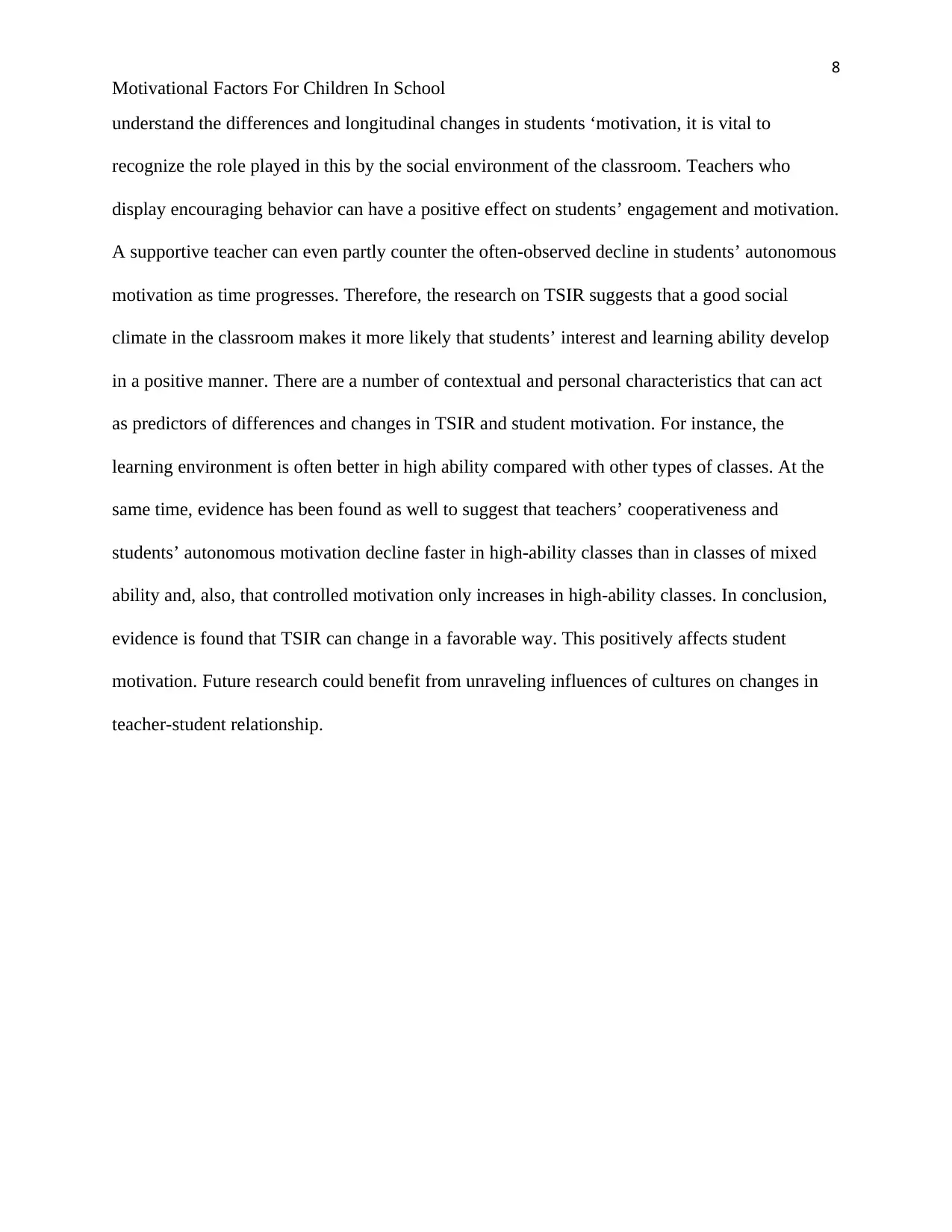
8
Motivational Factors For Children In School
understand the differences and longitudinal changes in students ‘motivation, it is vital to
recognize the role played in this by the social environment of the classroom. Teachers who
display encouraging behavior can have a positive effect on students’ engagement and motivation.
A supportive teacher can even partly counter the often-observed decline in students’ autonomous
motivation as time progresses. Therefore, the research on TSIR suggests that a good social
climate in the classroom makes it more likely that students’ interest and learning ability develop
in a positive manner. There are a number of contextual and personal characteristics that can act
as predictors of differences and changes in TSIR and student motivation. For instance, the
learning environment is often better in high ability compared with other types of classes. At the
same time, evidence has been found as well to suggest that teachers’ cooperativeness and
students’ autonomous motivation decline faster in high-ability classes than in classes of mixed
ability and, also, that controlled motivation only increases in high-ability classes. In conclusion,
evidence is found that TSIR can change in a favorable way. This positively affects student
motivation. Future research could benefit from unraveling influences of cultures on changes in
teacher-student relationship.
Motivational Factors For Children In School
understand the differences and longitudinal changes in students ‘motivation, it is vital to
recognize the role played in this by the social environment of the classroom. Teachers who
display encouraging behavior can have a positive effect on students’ engagement and motivation.
A supportive teacher can even partly counter the often-observed decline in students’ autonomous
motivation as time progresses. Therefore, the research on TSIR suggests that a good social
climate in the classroom makes it more likely that students’ interest and learning ability develop
in a positive manner. There are a number of contextual and personal characteristics that can act
as predictors of differences and changes in TSIR and student motivation. For instance, the
learning environment is often better in high ability compared with other types of classes. At the
same time, evidence has been found as well to suggest that teachers’ cooperativeness and
students’ autonomous motivation decline faster in high-ability classes than in classes of mixed
ability and, also, that controlled motivation only increases in high-ability classes. In conclusion,
evidence is found that TSIR can change in a favorable way. This positively affects student
motivation. Future research could benefit from unraveling influences of cultures on changes in
teacher-student relationship.
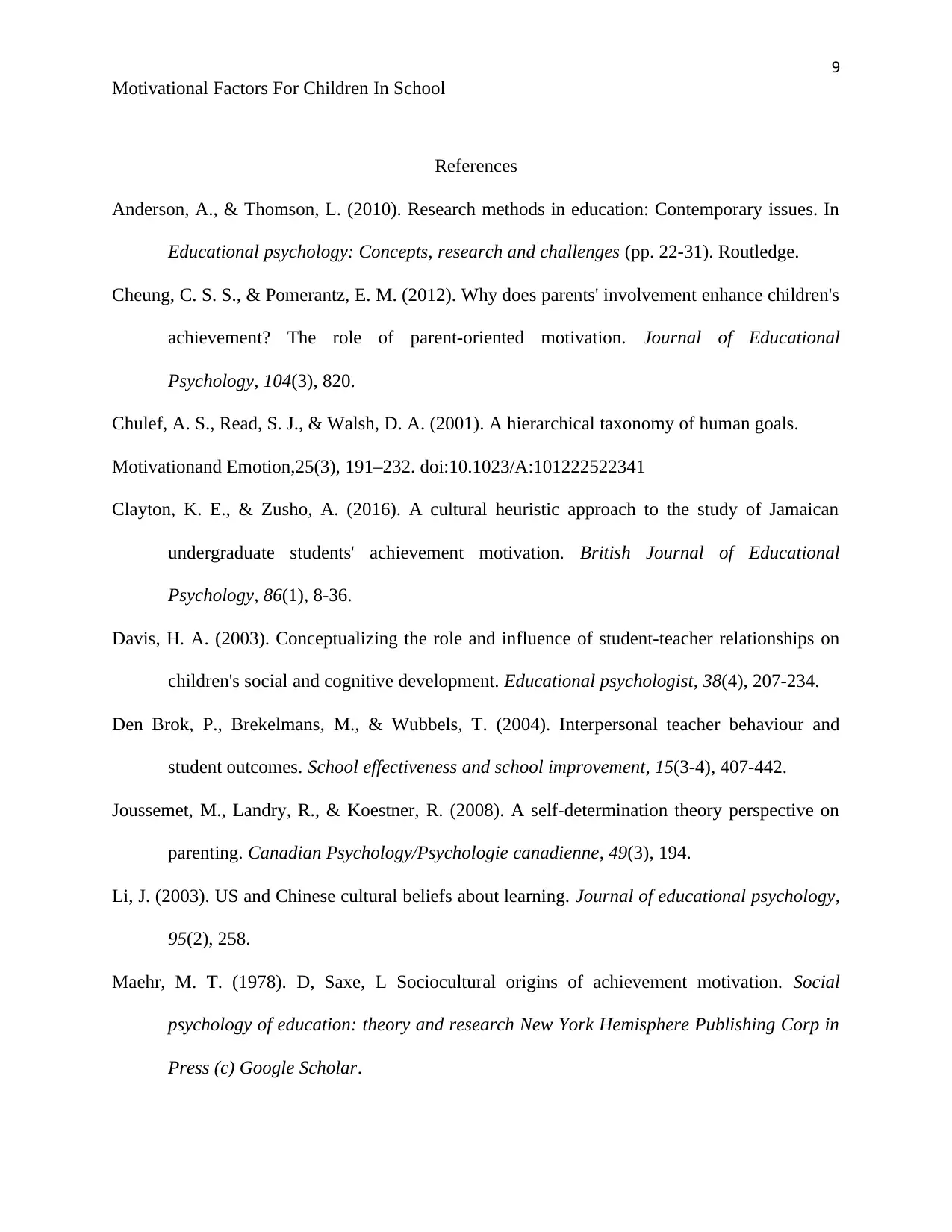
9
Motivational Factors For Children In School
References
Anderson, A., & Thomson, L. (2010). Research methods in education: Contemporary issues. In
Educational psychology: Concepts, research and challenges (pp. 22-31). Routledge.
Cheung, C. S. S., & Pomerantz, E. M. (2012). Why does parents' involvement enhance children's
achievement? The role of parent-oriented motivation. Journal of Educational
Psychology, 104(3), 820.
Chulef, A. S., Read, S. J., & Walsh, D. A. (2001). A hierarchical taxonomy of human goals.
Motivationand Emotion,25(3), 191–232. doi:10.1023/A:101222522341
Clayton, K. E., & Zusho, A. (2016). A cultural heuristic approach to the study of Jamaican
undergraduate students' achievement motivation. British Journal of Educational
Psychology, 86(1), 8-36.
Davis, H. A. (2003). Conceptualizing the role and influence of student-teacher relationships on
children's social and cognitive development. Educational psychologist, 38(4), 207-234.
Den Brok, P., Brekelmans, M., & Wubbels, T. (2004). Interpersonal teacher behaviour and
student outcomes. School effectiveness and school improvement, 15(3-4), 407-442.
Joussemet, M., Landry, R., & Koestner, R. (2008). A self-determination theory perspective on
parenting. Canadian Psychology/Psychologie canadienne, 49(3), 194.
Li, J. (2003). US and Chinese cultural beliefs about learning. Journal of educational psychology,
95(2), 258.
Maehr, M. T. (1978). D, Saxe, L Sociocultural origins of achievement motivation. Social
psychology of education: theory and research New York Hemisphere Publishing Corp in
Press (c) Google Scholar.
Motivational Factors For Children In School
References
Anderson, A., & Thomson, L. (2010). Research methods in education: Contemporary issues. In
Educational psychology: Concepts, research and challenges (pp. 22-31). Routledge.
Cheung, C. S. S., & Pomerantz, E. M. (2012). Why does parents' involvement enhance children's
achievement? The role of parent-oriented motivation. Journal of Educational
Psychology, 104(3), 820.
Chulef, A. S., Read, S. J., & Walsh, D. A. (2001). A hierarchical taxonomy of human goals.
Motivationand Emotion,25(3), 191–232. doi:10.1023/A:101222522341
Clayton, K. E., & Zusho, A. (2016). A cultural heuristic approach to the study of Jamaican
undergraduate students' achievement motivation. British Journal of Educational
Psychology, 86(1), 8-36.
Davis, H. A. (2003). Conceptualizing the role and influence of student-teacher relationships on
children's social and cognitive development. Educational psychologist, 38(4), 207-234.
Den Brok, P., Brekelmans, M., & Wubbels, T. (2004). Interpersonal teacher behaviour and
student outcomes. School effectiveness and school improvement, 15(3-4), 407-442.
Joussemet, M., Landry, R., & Koestner, R. (2008). A self-determination theory perspective on
parenting. Canadian Psychology/Psychologie canadienne, 49(3), 194.
Li, J. (2003). US and Chinese cultural beliefs about learning. Journal of educational psychology,
95(2), 258.
Maehr, M. T. (1978). D, Saxe, L Sociocultural origins of achievement motivation. Social
psychology of education: theory and research New York Hemisphere Publishing Corp in
Press (c) Google Scholar.
⊘ This is a preview!⊘
Do you want full access?
Subscribe today to unlock all pages.

Trusted by 1+ million students worldwide
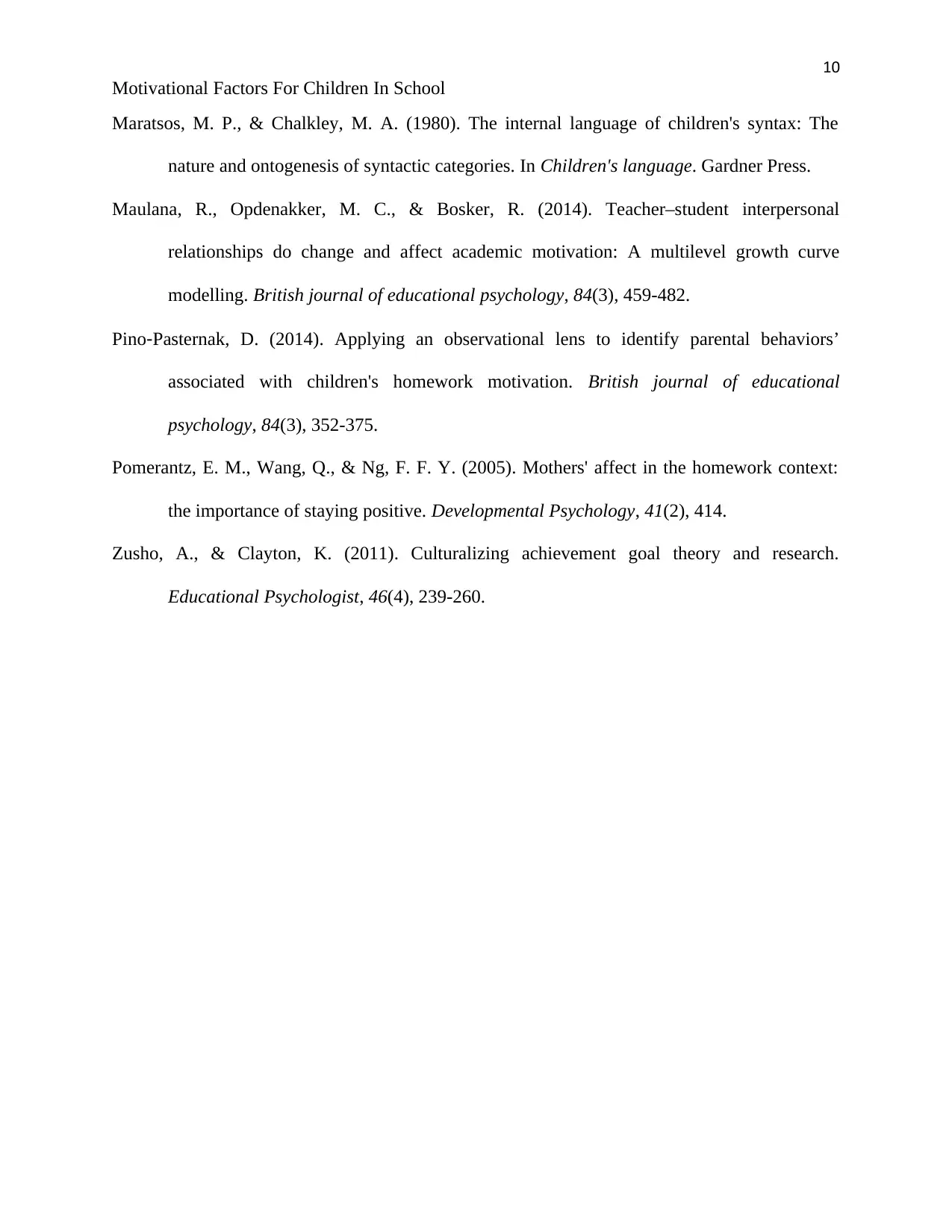
10
Motivational Factors For Children In School
Maratsos, M. P., & Chalkley, M. A. (1980). The internal language of children's syntax: The
nature and ontogenesis of syntactic categories. In Children's language. Gardner Press.
Maulana, R., Opdenakker, M. C., & Bosker, R. (2014). Teacher–student interpersonal
relationships do change and affect academic motivation: A multilevel growth curve
modelling. British journal of educational psychology, 84(3), 459-482.
Pino‐Pasternak, D. (2014). Applying an observational lens to identify parental behaviors’
associated with children's homework motivation. British journal of educational
psychology, 84(3), 352-375.
Pomerantz, E. M., Wang, Q., & Ng, F. F. Y. (2005). Mothers' affect in the homework context:
the importance of staying positive. Developmental Psychology, 41(2), 414.
Zusho, A., & Clayton, K. (2011). Culturalizing achievement goal theory and research.
Educational Psychologist, 46(4), 239-260.
Motivational Factors For Children In School
Maratsos, M. P., & Chalkley, M. A. (1980). The internal language of children's syntax: The
nature and ontogenesis of syntactic categories. In Children's language. Gardner Press.
Maulana, R., Opdenakker, M. C., & Bosker, R. (2014). Teacher–student interpersonal
relationships do change and affect academic motivation: A multilevel growth curve
modelling. British journal of educational psychology, 84(3), 459-482.
Pino‐Pasternak, D. (2014). Applying an observational lens to identify parental behaviors’
associated with children's homework motivation. British journal of educational
psychology, 84(3), 352-375.
Pomerantz, E. M., Wang, Q., & Ng, F. F. Y. (2005). Mothers' affect in the homework context:
the importance of staying positive. Developmental Psychology, 41(2), 414.
Zusho, A., & Clayton, K. (2011). Culturalizing achievement goal theory and research.
Educational Psychologist, 46(4), 239-260.
1 out of 10
Related Documents
Your All-in-One AI-Powered Toolkit for Academic Success.
+13062052269
info@desklib.com
Available 24*7 on WhatsApp / Email
![[object Object]](/_next/static/media/star-bottom.7253800d.svg)
Unlock your academic potential
Copyright © 2020–2026 A2Z Services. All Rights Reserved. Developed and managed by ZUCOL.





